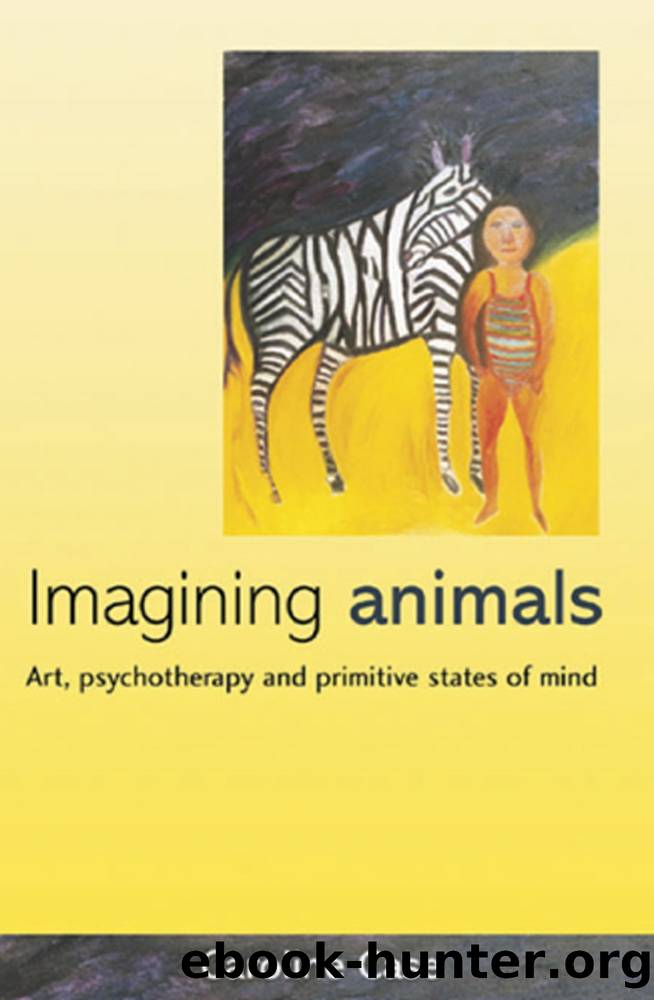Imagining Animals by Case Caroline;

Author:Case, Caroline; [Case, Caroline]
Language: eng
Format: epub
Publisher: Taylor & Francis Group
Published: 2005-08-15T00:00:00+00:00
In the Introduction to rt two (pp. 69â78) we have seen how emotional experience is given sense and contained by the mother for the baby, transformed and returned in a manageable form. They see the work of therapy to be the giving of emotional comprehension to emotional experience; that is emotions, sense impressions, thoughts, and unconscious phantasies need to be transformed into a form suitable for symbolic thinking. Otherwise these undigested memories are retained as things-in-themselves, to be got rid of by projection or acting out (Bion 1962a). The relationship of container/ contained needs to be introjected for thought to develop. In psychotic children it may have not taken place, or is being attacked by them or denied. Wendyâs terrors (see pp. 101â4) give a vivid idea of how concrete thinking and terror combine. She would hear a sound in the building and cower under a chair or whisper about it in terror. Having got rid, through projection, of something that could not be thought about, it would return as a persecutory object. I found that if I talked in a matter of fact manner about the noise and what I thought it was, and that it was outside her, not inside, her fears would subside, though the communication through sound, rather than the actual words was probably most important at this stage, as it is to a baby being soothed.
One of the defences employed by those suffering from psychosis is omnipotence, to keep feelings of helplessness at bay. Rosenfeld has developed theory in this area, describing destructive narcissism (Rosenfeld 1971: 246). Parts of the self are idealised and there is a turning away from parental figures by the phantasy that essential needs can be satisfied by the individual alone. This can be met with in traumatised children, alongside the fragmentation described below, and was apparent at the start of work with Colin and Lucy described in Chapter three. Splitting of parts of the self so that links between emotion and thought cannot be made and painful experience is held separately; it is a further defence:
Splitting may cause some specific intellectual function, such as memory, or the capacity to think symbolically and to understand metaphor, to be cut off in order to prevent the making of painful emotional links between certain thoughts (Bion 1959). An even more thorough fragmentation leads to the minute splitting of the self described by Bion; or the disintegration described by Rosenfeld (1947: 26â9) and thus cause the cessation of thinking and feeling.
(Dubinsky 1997: 13)
Download
This site does not store any files on its server. We only index and link to content provided by other sites. Please contact the content providers to delete copyright contents if any and email us, we'll remove relevant links or contents immediately.
Overcoming ADHD Without Medication : A Guidebook for Parents and Teachers by Children and Natural Psychology Association for Youth; Children The Association for Youth(751)
Out of the Mainstream: Helping the Children of Parents with a Mental Illness by Loshak Rosemary;(743)
Depression by Adams Media(693)
The Noom Mindset by Noom(516)
Delphi Collected Works of Sigmund Freud (Illustrated) by Sigmund Freud(499)
The Psychology of Media and Politics by George Comstock & Erica Scharrer(428)
MANIPULATION & MIND CONTROL: The Persuasion Collection: Dark Psychology Secrets, Analyze & Influence People with Nlp. How to learn Reading Friends and Develop Body Language Skills. by ROBERT TOWER(416)
The 48 Laws of Mental Power: Overcoming Trauma and Building Mental Strength by Victor O. Carl(380)
It's nobody's fault: new hope and help for difficult children and their parents by Harold Koplewicz(373)
Behold the Monster by Jillian Lauren(373)
Directions in Technical Writing and Communication by Gould Jay R.;(367)
The Hypnotic Coach: A Conversational Hypnotherapy Tool Kit by Marion Jess(360)
Sigmund Freud by Janet Sayers;(331)
THE PSYCHOLOGY OF ENTREPRENEURSHIP; New Perspectives by Michael M. Gielnik; Melissa S. Cardon; Michael Frese(317)
Positive Psychology Across the Lifespan; An Existential Perspective by Piers Worth(314)
Mastering Flow: Perform Better, Experience More Joy, and Live a Happier Life by Nils Salzgeber(309)
Mind Hacking Secrets and Unlimited Memory Power: 2 Books in 1: Learn How to Improve Your Memory & Develop Fast, Clear Thinking in 2 Weeks + 42 Brain Training Techniques & Memory Improvement Exercises by Sharp Scott(306)
The Modern Young Man's Guide to Manhood by Wayne Walker(305)
Secrets of the Autistic Millionaire: Everything I know about Autism, ASD, and Asperger's that I wish I'd known back then... by David William Plummer(287)
